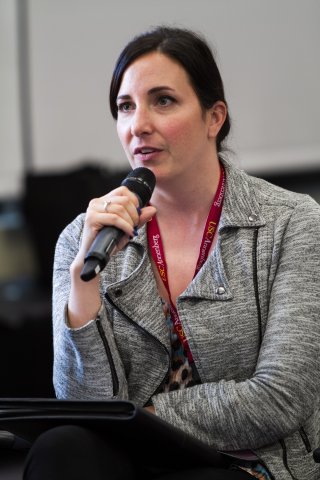
“The entrepreneurial urge runs deep in me,” she says.
Schreiber is one of twelve Third Space Founding Advisors. Schreiber was also a participant in Annenberg Forum 2014, which was about the Third Space. Today, from her perch at the center of Silicon Valley, Schreiber has a wide view of what the next Mark Zuckerbergs of the world are up to. As vice president of marketing for one of the most successful and respected venture capital firms in the technology world, Greylock Partners, her job is to help entrepreneurs with their marketing efforts and to manage all marketing activities for the firm. Before that, she ran global communications for Hulu, where she launched Hulu Plus, the fastest-growing online video subscription service in U.S. history, which grew to more than 5 million paid subscribers during her tenure there.
Elisa was one of the first TEDx organizers when she co-produced TEDxUSC while running marketing and communications for the USC Stevens Institute for Innovation.
At USC Stevens, she also advised early-stage start-up companies. The 36-year-old holds an undergraduate degree in communications from UC San Diego and an MBA from the USC Marshall School of Business, combining a creative background in art, design and writing with hardcore business and operational skills.
“Having strong visual and writing skills helped me advance in the first twelve years of my career, but I realized that I had a blind spot around technology, economics and business, so I went for an MBA to round out my fluency in those areas.”
This combined “soft-hard” background has equipped her beautifully for her role at Greylock. From her perspective as an expert marketing for tech start-ups, Schreiber has a lot to say about what companies and colleges can do to better prepare young people to fill the critical need for Third Space Thinkers.
“If we agree that the Third Space is about developing people who bring a fluency in technology, economics, and design to their daily jobs, then universities need to inspire and nurture this breed of talent by making sure such people get the training they need. The major research universities that offer innovative curriculum to support this talent evolution will become the center of the ecosystem for corporations and students.” Specifically, Schreiber notes, communications professionals today also need to understand how their decisions can effect the company’s bottom line, and the mechanics of how their business operates.
“With this kind of working vocabulary,” she says, “people beginning their careers are much more interesting candidates.”
